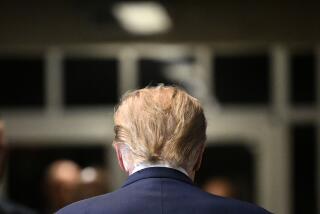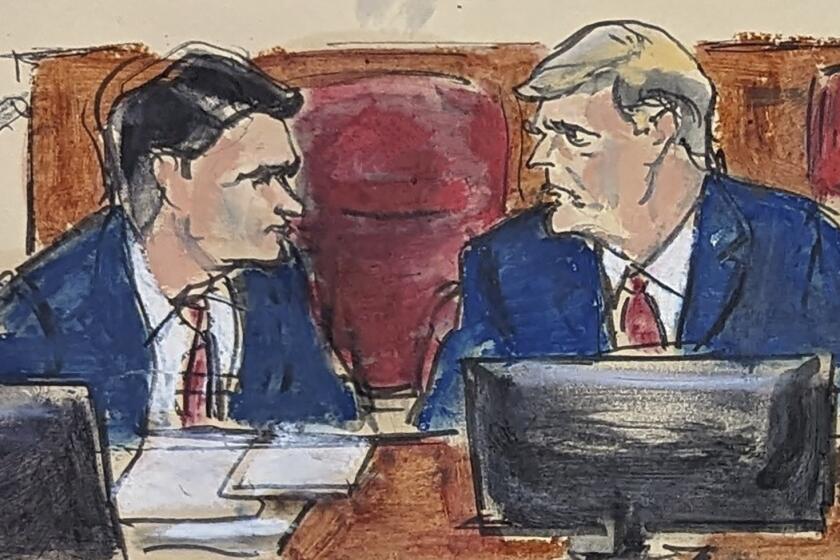Reelection Honeymoon With Voters Eludes Bush, Polls Say
Despite a clear-cut reelection and the prospect of lasting GOP dominance in Congress, President Bush prepares to start his second term with the lowest approval ratings of any just-elected sitting president in half a century, according to new surveys.
That distinction, which pollsters and analysts blame on public discontent over the war in Iraq, comes as Bush begins drafting two major speeches that could quickly recast his image: an inaugural address Jan. 20 and the State of the Union soon after. Bracketed between them is the Jan. 30 election in Iraq, another milestone that could affect public impressions of Bush.
His performance in those speeches and the outcome of the Iraqi vote could determine whether Bush regains the momentum from his Nov. 2 election victory in time to push through controversial initiatives such as revamping Social Security, rewriting the tax code, limiting lawsuits and trimming the budget deficit, analysts said.
A Gallup survey conducted for CNN and USA Today puts Bush’s approval rating at 49% -- close to his preelection numbers. That’s 10 to 20 points lower than every elected sitting president at this stage since just after World War II, according to Gallup, which has been tabulating such data since Harry S. Truman won a full term in 1948.
Bush’s Gallup rating echoed a survey published last week by ABC News and the Washington Post, which put his approval rating at 48%. That poll also found that 56% of Americans believed the Iraq war was not worth fighting. Time magazine also put Bush’s overall approval at 49%.
“The question is, what happened to the honeymoon?” asked Frank Newport, editor of the Gallup survey.
David Winston, a Republican pollster who advises the Senate leadership, said, “Communications up front is going to be as important as any task that they have at this point. There is a lot of important messaging that this administration is going to have to do in January and in February. It’s taking the issues and the agenda and beginning to set it up in a way that the American public has a clear understanding of the direction he’s going to go.”
White House officials say Bush is working on early drafts for both speeches, even as he takes his vacation at his Crawford, Texas, ranch.
Unlike other presidents, who cruised toward inaugural festivities on a tide of growing public support after reelection victories, Bush has had to somberly respond to mounting U.S. casualties in Iraq. Last week, he made a rare concession: “No question about it, the bombers are having an effect.”
One person who met with Bush the same day a U.S. military mess tent was bombed in Iraq described the president as “distraught.”
“A lot of the talk about momentum and agendas and political realignment is overdone, in the sense that it all depends on this contingent fact of how Iraq goes,” said William Kristol, editor of the conservative Weekly Standard.
Also complicating matters for Bush’s postelection image is the anticipation that the first budget of his second term is likely to include unpopular cuts to social programs and even the Pentagon.
And the Bush administration has been criticized for failures in vetting former New York City Police Commissioner Bernard Kerik, who amid ethical concerns withdrew his name from nomination to be the next secretary of Homeland Security.
The approval rating for a second-term president is less crucial, given that he will not be facing the voters again.
But Bush has outlined an ambitious second-term agenda that will require support from skeptical Republicans and Democrats alike on Capitol Hill. He must be able to show continued support from the public. Otherwise, members of Congress, facing their own reelections in 2006, will be wary.
“If his approval rating falls, regardless of his winning the election, it’s going to hurt his ability to convince Congress,” said Alan Abramowitz, an Emory University political scientist. “Republicans have the majority and can do almost whatever they want if they stay together, but it’s going to make it harder for them to get some bipartisan support for these initiatives.”
Kristol said the new year would bring opportunities for Bush to showcase successes -- if the administration handled them well. He noted the elections scheduled in Iraq and within the Palestinian Authority in January, along with a possible debate at home over a new Supreme Court chief justice. Also, Kristol said, Bush could point to the election in Ukraine as evidence of democracy spreading.
“It’s a big opportunity, and it’s a big challenge for Bush,” said Kristol, referring to the flurry of events expected to unfold in early 2005. “All of the little stuff that’s happened the last five weeks won’t matter much after that.”
More to Read
Get the L.A. Times Politics newsletter
Deeply reported insights into legislation, politics and policy from Sacramento, Washington and beyond. In your inbox three times per week.
You may occasionally receive promotional content from the Los Angeles Times.






